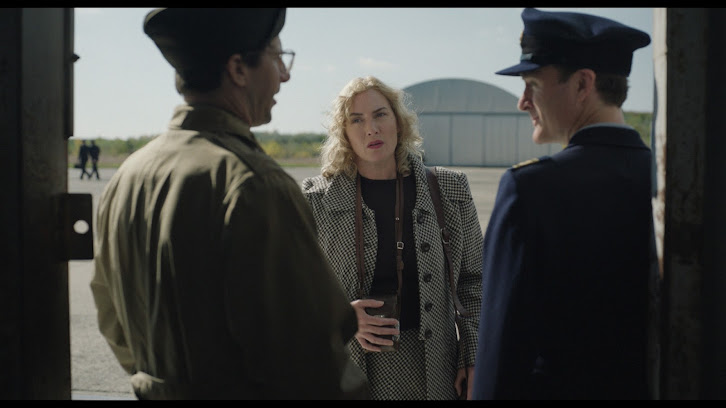Biopics are tough to get right. For every Lawrence of Arabia, there's a Diana, for every Raging Bull, there's an Ali. The film Lee shines some natural light of the life of renowned war photographer Lee Miller, played by Kate Winslet. She gives it full welly in this - physically and emotionally nude, with camouflage painted boobs, close-ups with no make-up, moles, wrinkles, rage and tears. It's very much the kind of 'brave' performance that the Academy loves to reward.
The film starts with Miller crustily answering questions to a young man in 1977, and as she remembers things from her past, we head to flashback territory. It seems a fairly cack-handed framing device until we realise why it's happening. A modicum of research reveals that the film is a pretty accurate retelling of Miller's life - first her carefree bohemian days in pre-WW2 France (including her intro to future hubby, Roland Penrose, played by Alexander Skarsgård), then how she started with Vogue magazine, and finally (and crucially), her days as one of the only female war photographers in Europe. The veracity of all this is probably due to the film being derived from her son, Antony Penrose's biography, The Lives of Lee Miller.
The cast is a mixed bag. Winslet ticks all the 'acting' boxes and, while it's clear what she's doing, she's doing it well. Skarsgård though, is a dud. He bears a resemblance to the real Penrose but he has a chasmic lack of charisma. Marion Cotillard is underused as Solange D'Ayen, as is Noémie Merlant as Nusch Eluard (both friends of Miller). Josh O'Connor, as the 1977 interviewer, is typically bland. Andrea Riseborough, as British Vogue editor Audrey Withers, is always a welcome addition, but the biggest surprise was Andy Samberg as Miller's assistant, Davy Scherman. I've only seen him as a goose or a smartarse but here he's surprisingly tender and really impressive.
There are some confronting moments surrounding Miller's photographs of the Dachau and Buchenwald camps, and again, they're probably spot on factually, but they were staged to elicit maximum outrage and revulsion. The build-up to the famous photo in Hitler's bathroom is a compelling scene, especially Scherman's role in it (some fine under-playing by Samberg, albeit with some ripe dialogue).
On that, the writing is probably the soft underbelly of the film. There are four credited writers, adapting the Penrose book, and the lack of cohesion shows at times. There are a couple of well handled moments but this is more down to Ellen Kuras's direction and the performers rather than the script, which had more than a whiff of cliche to it. Take Miller and Penrose's first meeting, and Miller and Withers talking about not having kids, as ropey examples.
Also, I can understand not having any mention of Hemingway (while they knew each other, they didn't have much of a relationship) but I feel they missed a trick not comparing Miller to her contemporary, Robert Capa. Both war photographers operating at the same time in Europe, both familiar with one another's work, both driven by a desire for the perfect shot. It's very tricky to do justice to Miller's work, a bit like making a successful biopic. Lee the film isn't the best stab at it, but kudos to Winslet for bringing Lee the person to the screen.
Lee is showing at Palace and Luna cinemas.
See also:
Michael Winterbottom's excellent Welcome to Sarajevo (1997) shows photographers and journos in a later war, and there's a similarity to Joe Wright's Atonement (2007), but I'm not telling how.



Comments
Post a Comment